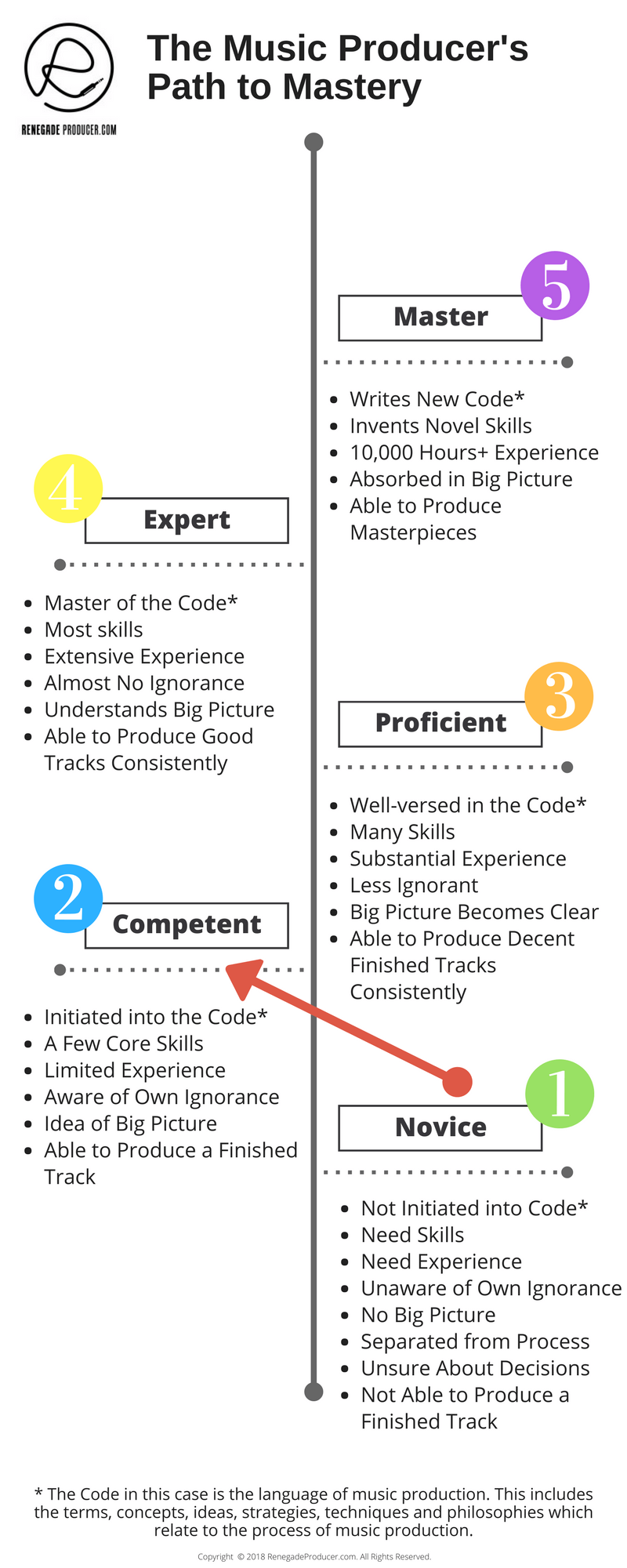25-step music production process checklist and video workshop >>>
Interested in Becoming a Music Producer?
Discover the 5 Stages All Producers Go Through & The 5 Obstacles Most New Producers Face Below!
In this post we look at the 5 stages a producer goes through on the journey from complete novice to master and the 5 challenges to overcome.
Every art or craft has a code. Becoming a music producer is no different. This code consists of the language, concepts, practices, theories and philosophies which are used by practitioners of the art. The code is why a discussion about mixing music, for example, will sound like hieroglyphics to someone who knows nothing about music production. They're not initiated into the code.
The first job of any aspiring music producer is to get initiated into the code. This can be done through an educational institution like a college or university, or through self-learning using readily available resources.
A firm grasp of the code allows you start your music production journey. The better you know and understand the code the faster you'll learn new music production. This is why initiation into the code is one of the factors that takes a producer from novice to competent.
Let's take a closer look at the stages of becoming a music producer:

Stage 1: Novice
We all have to start somewhere when becoming a music producer and that somewhere is usually complete ignorance. It also means a lack of music production skills and no experience. This is also the stage where the Dunning–Kruger effect may be in effect as the beginner producer has no idea of how much they don't yet know.
At this stage it's vital to learn as much as possible and develop the core music production skills. Glossaries with definitions and product manuals are needed. Music production forums can be helpful. Step-by-step tutorials help too.
An effort must be made to get the big picture and this means working towards finishing that first complete track.
The goal of this stage is to become competent so the focus should be on knowledge, skills and above all practice.
Set up your studio, master your DAW, figure out what you need to learn and work towards finishing your first decent track.
Stage 2: Competent
It's at this stage of becoming a music producer that producers start to realize how much they still have to learn and do in order to get to the level of production mastery they want to achieve. The big picture starts to emerge.
They have the skills needed to finish a track but they may find that the quality from track to track still varies because their skills have not been honed and refined yet.
At this stage it's all about getting in the the hours. Get as many tracks done as possible. Most will suck. Some may not. It's all part of the process of becoming a music producer.
Keep on making more. The goal at this stage is to make more good quality tracks more often. Develop and refine your studio workflow and focus on your creative output.
Stage 3: Proficient
Now the music producer can produce decent tracks with a reliable consistency. They start to develop a more well-placed confidence in their production skills. It's also here where they will start to narrow in on their own unique sound.
There will still be gaps in their knowledge but they will be aware of these and work to rectify them to become more well-rounded as a music producer.
The learning continues, the practice continues. With time and work they become an expert producer.
Stage 4: Expert
Most producers will not make it to this stage of becoming a music producer. The expert producer knows just about everything there is to know about music production. They have almost forgotten just how much they know and they know a lot. They also have mastery of a variety of production skills and extensive experience in the studio.
The only stage they could possibly ascend to is Mastery...
Stage 5: Mastery
This is the ultimate goal as a producer. The master producer develops and introduces novel code to the music production craft. They develop techniques not used before. They change the music culture. Most of all, the master produces true musical masterpieces.
The cold hard truth is that very few producers make it to this stage. It takes obsession. It takes sacrifice. It takes grit.
Still, mastery is what we aim for and with some luck and massive effort we might just get there.
One thing is certain:
There's no stage where one can rest on one's laurels when becoming a music producer. Even past masters can lose touch with the current. The learning never stops.
Our competition is not with other producers. The main battle is with oneself. Are you a better producer today than you were yesterday? That's all that really counts.
Discover 5 obstacles or challenges independent music producers face on the road to mastery:
Below you'll find a list of producer foes. These 5 fiends are challenges or obstacles most of us face as we traverse the long road to becoming a music producer that gets respect.
Learn to know these enemies to your success and adjust your strategy to overcome or at the very least harness them to contribute to your success as a music producer.

Producer Foe #1 - Absence of a Vision
You want to be clear about which type of life you want to create as an independent music producer. Just saying that becoming a music producer is your goal won't cut it.
Do
you want a life where you spend most of your time on a day-job, with
your music production pushed back to the status of a part-time hobby?
Do you want to earn all the money you need by doing music full time?
It's an important question to ask yourself:
"What type of music-business-life do I want to create?"
Create
a clear picture of what you want to do. The more clear your vision, the easier it will be to stay on
track when times get tough.
Producer Foe #2 - Presence of Doubt
Your doubts will come back to haunt you again and again as you progress with your music career.
How you deal with your doubts will determine the pace of your progress. You
may have doubt in your talents. You may think you have no ability to
make your own music or that your music will not be appreciated. You
may hear a new track in your genre and be so blown out of the water by
the quality you start to feel hopeless because of your own lack of
progress.
The list goes on.
The main thing to remember
when in doubt is that you would not have an urge to do something without
the ability to make it happen. The urge you feel to make and
share your music is the energy which you can transform into music and
income through focus, discipline and practice.
The best thing to
overcome doubt is to do one thing straight away which brings you closer
to your vision. Even one small step in the right direction gets you
started, that's usually all we need.
Producer Foe #3 - Lack of Skills and Experience
You'll find listed below just some of the skills you must have as an
independent producer (or be willing to pay for)...
Music production and performance skills, studio skills, business skills, marketing/promotion skills and administrative skills.
You can see there is much to learn as an independent artist and producer.
The way to overcome this obstacle is to adopt an attitude of the perpetual learner, while you're becoming a music producer and even after. The learning doesn't ever stop.
You know there is a learning curve involved, so be patient with yourself and do little bits at a time, constantly and consistently. Remember that the best way to learn music production is by producing music. A firm grasp of the theory and knowledge is important, but on-the-job training is the fastest way to grok music production and hone your craft as a producer.
Producer Foe #4 - The Reality of the Job
You work a full time or part time job just to have money to live with.
Your life overheads need to be paid. So you do it to get by. Do
you love your job? Well, maybe you do if it's a very new job or you are
part of a small minority who has a job you actually love.
No matter how you feel about your job, the reality is this: A
full-time job takes most of your waking time and your best energy,
leaving you with very little left to invest in to your career as a music producer.
You may get money and even be able to build your studio, still, your music will always have to fit in around your job. You can make your own music, and make it well, as long as you have the time and energy it takes to produce music. It's a tough balance to maintain.
One way to overcome this obstacle is to create automated income sources
using your passion or expertise in order to replace your job income. My
suggestion is to create stable business income which requires
less-and-less of your time to maintain as you go along. You can then feed
your money, time and energy into your music production, performance and
promotion activities as your time frees up.
Producer Foe #5 - The Lack of Support
Friends and family play a vital role as they need to understand the demands music production makes on an artist.
They may want your attention for valid reasons and to balance music production and family life can become quite a tricky thing to do. You will be well off advising people close to you how much you want to make music and explain to them the amount of time this requires from you.
Make time for friends and family though because these are the people who will be there when you need help, so it's not wise to neglect them. Apart from family and friends you also need the Support of fellow artists and producers for inspiration, advice and most importantly, critique of your works. Your network will also be the first people to Support your work when you release it, so treat them well!
You can also join professional organizations and bodies to further expand your network and support group. You can avoid the lack of Support by maintaining sincere relationships with the people around you.
On the flipside, beware of friends or family who demand too much attention because they can make it difficult to focus on becoming a music producer.
Be mindful of the above 5 foes, work to overcome or side-step them and all of a sudden becoming a music producer seems a whole lot easier! Here are some producer mindset posts that you may find useful:
Frequently asked questions about becoming a music producer…
What are the skills needed to be a music producer?
Becoming a music producer requires the ability to navigate between creative chaos and productive organization. The skills you need as an electronic music producer are many which ranges from music theory all the way to the ability to mix tracks.
You can find out more about the skills you need to become a music producer in this post.
Is it hard to become a music producer?
Short answer: Yes!
Longer answer: A music producer needs to develop a wide variety of music production skills and techniques. A large amount of these skills can only be mastered with experience and practice. This means that it can take 3 to 5 or even 10 years to become proficient with production.
This all means that you’ll need persistent, patient practice and effort towards improving your skills which can be hard.
How do you make the music production learning process easier?
The only real hack is to find a good music production mentor. The second best option is to create a system for deliberate practice and learning. A system will help you to progress faster and keep momentum better than random music production tips and trick.
Definitely read this recent post if you want to know what the best way is to learn music production faster:
What does a music producer do on a day to day basis?
An electronic music producer can have various types of sessions in the studio. These include production, sound design, practice and admin & organization sessions.
Schedules and work times vary from producer to producer. Some producers work best early in the morning, others are at their best when the rest of the world is asleep
Common day to day tasks may include starting new ideas or creating scratch tracks, creating new sounds, working out instrumentation, arranging tracks, doing mixdowns, organizing sample libraries, updating software and plugins, collaborating and communicating with artists and labels and backing-up sessions.
Check out this post on the music production process if you want to know how many producers typically work on tracks.
What do I need for music production?
You need a space to make music. You need a little studio set up and tuned for production. You need music production software and plugins. You need basic music and production skills. You need practice. Last but not least you need patience. Becoming a music producer takes time. A lot. ;-)
Do you need to know how do you play an instrument to be a music producer?
You don’t have to learn to play an instrument to become a music producer. You’ll probably be a better producer if you can however play guitar or piano. So, even though it’s not a requirement it’s a good idea if you plan to become a great producer.
The reason it’s helpful is because it helps you understand not only music better but also helps you understand and communicate with musicians easier. An instrument is also a great place to start out new track ideas.
I hope you've found this post about becoming a music producer helpful. Please share it with other producers you know!
Remember to also grab your copy of The Renegade Report so you don't miss out on updates and exclusive producer content:
Top Related Pages...
Online Music Production Course for Beginners
Music Production Schools & Colleges: The Lowdown for Aspiring Music Producers & Beatmakers
Flow and the music producer...
The War of Art: Resistance and the music producer...
52 Fantastic Ways to Fire Up Your Musical Inspiration
Why It's Important to Finish Tracks
Make Tracks Not Loops - Overcome 8-Bar Loop Syndrome
Share this post. Spread the knowledge so other producers can benefit too:
- Renegade Producer
- Become a Music Producer
ⓘ Some pages contain affiliate links so I might earn a commission when you buy through my links. Thanks for your support! Learn more

